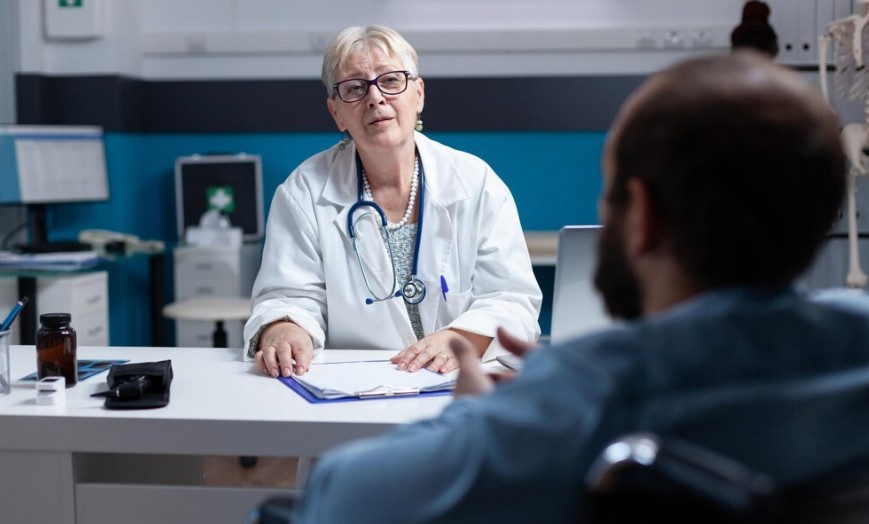When you’re feeling unwell or dealing with a health concern, it can sometimes be difficult to know whether you should head to the hospital, book a GP appointment, or simply visit your local pharmacy. Understanding the role of each service and knowing when to use them can help you get the right treatment faster while also easing pressure on the NHS.
Here’s a helpful guide to know where to turn depending on your symptoms and situation.
🏥 When to Go to the Hospital (A&E)
The hospital’s Accident & Emergency (A&E) department is designed to treat serious or life-threatening conditions. You should go to A&E or call 999 in the following situations:
- Severe chest pain or suspected heart attack
- Breathing difficulties or severe asthma attack
- Heavy bleeding that won’t stop
- Loss of consciousness or seizures
- Severe head injuries or major trauma
- Suspected stroke (use the FAST test: Face, Arms, Speech, Time)
- Severe allergic reactions (anaphylaxis)
- Serious burns or scalds
A&E should only be used for emergencies. If you’re unsure whether you need A&E, you can call NHS 111 for guidance. They can assess your symptoms and direct you to the right service.
👩⚕️ When to See Your GP
Your General Practitioner (GP) is your first point of contact for non-emergency medical issues. GPs can diagnose and treat a wide range of health problems, provide prescriptions, and refer you to specialists if necessary.
You should book a GP appointment for:
- Persistent or worsening symptoms (e.g., ongoing cough, unexplained pain)
- Chronic conditions (e.g., asthma, diabetes, high blood pressure)
- Mental health concerns (e.g., depression, anxiety)
- Infections that don’t improve with over-the-counter treatments
- Preventative care (e.g., vaccinations, health screenings)
- Ongoing conditions that need monitoring or medication reviews
If you’re struggling to get an appointment with your local surgery, you can see a doctor online quickly and conveniently. With a virtual doctor’s consultation, you can discuss symptoms, get advice, and even receive prescriptions from the comfort of your home. This is particularly helpful for minor issues or when you need medical support outside regular hours.
💊 When to Go to the Pharmacy
Pharmacists are qualified healthcare professionals who can offer advice and over-the-counter treatments for many common conditions. In many cases, visiting your local pharmacy can save you a trip to the GP.
You can visit a pharmacy for:
- Minor illnesses (e.g., coughs, colds, sore throats)
- Pain relief (e.g., paracetamol, ibuprofen)
- Digestive issues (e.g., diarrhoea, constipation, indigestion)
- Skin conditions (e.g., rashes, eczema, athlete’s foot)
- Emergency contraception
- Travel health advice (e.g., insect repellent, motion sickness tablets)
Pharmacists can also recommend when you should seek further medical attention, making them a great first point of contact for minor health concerns.
✅ When to Use NHS 111
If you’re unsure where to go, the NHS 111 service can help. You can call 111 or visit 111.nhs.uk for advice. This service is available 24/7 and can direct you to the most appropriate care, whether it’s A&E, a GP, or a pharmacy.
💡Choosing the Right Healthcare Option Saves Time and Resources
By knowing when to visit A&E, your GP, or a pharmacy, you can get the right care faster and help reduce unnecessary pressure on emergency services.
For non-urgent medical issues, booking an online GP appointment is a convenient and efficient option. You can talk to a doctor online at a time that suits you, without the need to leave your home. This is particularly helpful if you need quick medical advice, repeat prescriptions, or guidance on managing ongoing health conditions.
Next time you’re feeling unwell, remember:
- Hospital = Emergencies only
- GP = Ongoing or non-urgent issues
- Pharmacy = Minor ailments and medication advice
If you need to see a doctor online or book a video GP appointment, tapGP offers quick and easy access to trusted UK doctors from the comfort of your home.
Disclaimer: This article is for informational purposes only and is not a substitute for professional medical advice. If you are experiencing severe symptoms or have concerns about your health, seek immediate medical attention or consult a healthcare professional.

